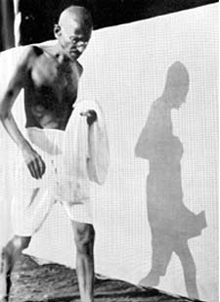Withdrawn Module: Gandhi and Indian Nationalism (HI161)
 Please note that this module was available
Please note that this module was available
from 2006 to 2012, but has since been
withdrawn and is no longer available.
Tutor: Professor David Hardiman / Dr Aditya Sarkar
This first-year and second-year option module provides an introduction to an important aspect of modern Indian History for students who have not necessarily studied Indian history previously. It focuses on Gandhi as the most important figure in India of the period c.1915-48. Gandhi had his own vision of an alternative society that was based on mutual respect, a lack of exploitation, non-violence and ecological harmony. He sought to put this vision this into practice, and in doing this with commitment and courage, he came into conflict with a range of opponents, ranging from the British colonial rulers of India, to Indian advocates of violent resistance, right-wing religious leaders and upholders of caste privilege, communists and socialists, and even leaders of the oppressed classes, such as the Indian untouchables. These different conflicts and their underlying causes will each be looked at in turn. Gandhi’s sexuality and his programme for women will also be examined in the light of feminist critiques. Gandhi was not always consistent, and he made many mistakes. His failures will be scrutinized in a critical way. He made many enemies, and in the end was assassinated by a Hindu chauvinist who was a votary of a politics of religious hatred.
The module starts by examining the background to British colonial rule in India and the economic, social and cultural impact of that rule. It then goes on to examine the early history of Indian nationalism and popular protest from 1885 onwards, before looking at Gandhi’s early life in India, London and South Africa, his changing relationship to the British and his vision for a future India, his return to India and the massive upsurge in nationalism in India between 1917 and 1922. During the second term the focus will be more on Gandhi’s often troubled relationship and his continuing dialogue with a range of groups within India, such as the peasantry, Hindu fundamentalists, the untouchables, the capitalist and working classes, women, and Muslims. Various nationalist protests will also be looked at, and also the political events leading up to independence and the partition of India in 1947. There will be an assessment of Gandhi’s role during the partition period – often considered his ‘finest hour’ - his assassination in 1948, and his legacy subsequently in India and the wider world. Gandhi, through his life and moral activism, has provided a beacon for many people in subsequent years.
Over the past thirty years, there have been many path breaking studies of the history of Indian nationalism that have made this area of history a particularly lively one, and students will be able to engage with this rich literature.
